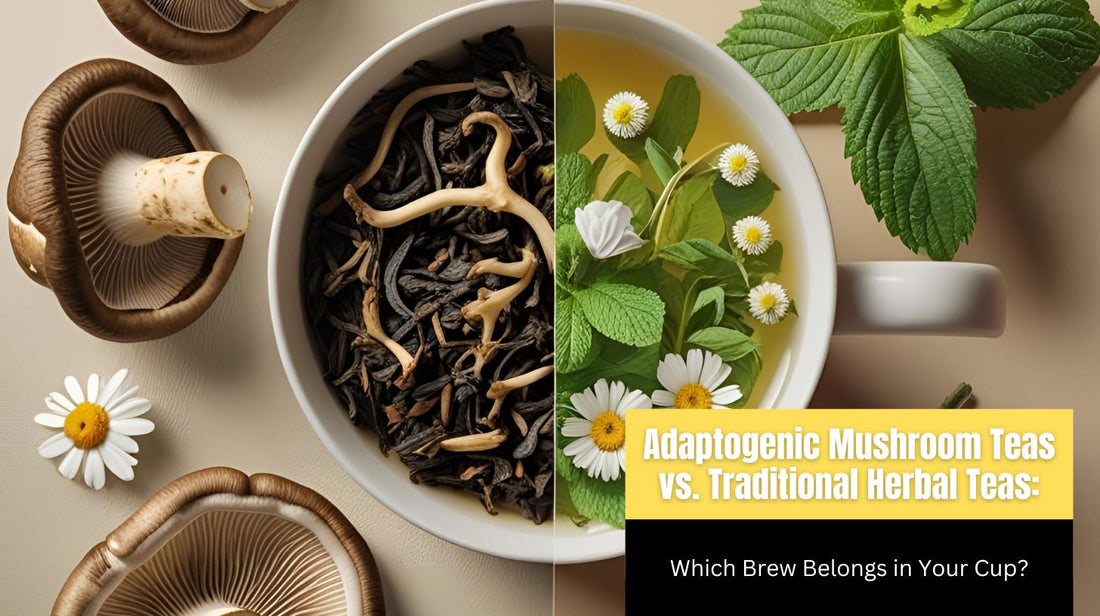
Adaptogenic Mushroom Teas vs. Traditional Herbal Teas: Which Brew Belongs in Your Cup?
Tea Time Is Getting Complicated (but in a Good Way)
Once upon a time, tea meant black, green, or maybe chamomile if you were feeling fancy. Fast forward to 2025, and suddenly your options include things like “lion’s mane latte,” “chaga immunity brew,” and “reishi relaxation elixir.”
So... should you be sipping mushroom teas now? Or stick with your soothing chamomile and digestive peppermint?
Spoiler: Traditional herbal teas still reign supreme for most people. But mushroom teas are powerful allies—if you know how and when to use them.
Let’s break it down.
2. Meet the Contenders
🍄 What Are Adaptogenic Mushroom Teas?
Adaptogenic mushrooms are non-psychedelic fungi that help your body adapt to stress. They're typically dried, ground, and steeped like tea—or blended into lattes. Common stars include:
- Reishi: "The chill one." Supports sleep, stress relief, and immune balance.
- Chaga: Rich in antioxidants and great for skin and immune support.
- Lion’s Mane: The brain booster—focus, clarity, memory.
-
Cordyceps: Great for energy and stamina (hello, gym tea).
They taste earthy, deep, and slightly bitter—think forest vibes.
🍃 What Are Traditional Herbal Teas?
You already know and probably love these:
- Chamomile – for sleep and calm.
- Peppermint – for digestion and freshness.
- Hibiscus – for heart health and a fruity zing.
- Ginger – for inflammation and tummy troubles.
-
Moringa – packed with nutrients and antioxidants.
Taste-wise, they’re fragrant, floral, zesty, and generally more beginner-friendly.
3. Health Benefits: Who Does What?
Immunity & Inflammation
- Chaga & Reishi: Packed with beta-glucans and antioxidants.
-
Ginger & Moringa: Naturally anti-inflammatory and immune-supportive.
Winner: Tie
Mushroom teas bring high antioxidant value, but traditional herbal teas are gentler and backed by centuries of use.
Brain & Focus
- Lion’s Mane: Known for neuroprotective support and improved cognition.
-
Green tea + peppermint: Improves alertness, especially when combined.
Winner: Slight edge to mushrooms, but herbal blends with green tea do the job for most casual sippers.
Stress & Sleep
- Reishi: Helps regulate cortisol and supports deeper sleep.
-
Chamomile & Lavender: Calms the nervous system and soothes anxiety.
Winner: Traditional herbal teas—they're gentler and easier on the palate.
Heart & Metabolism
- Cordyceps: Boosts stamina and oxygen uptake.
-
Hibiscus: Known to lower blood pressure and support heart health.
Winner: Herbal teas, especially hibiscus, for accessible daily heart support.
4. Taste & Accessibility
Let’s be real: mushroom teas can taste like tree bark had a baby with soil. It’s...an acquired taste.
- Mushroom teas: Deep, woodsy, often bitter unless blended well.
-
Herbal teas: Floral, minty, citrusy, sweet, and way easier for first-timers.
Winner: Traditional herbal teas, by a landslide. Great taste, no weird after-earth.
5. Cost, Convenience & Sourcing
- Adaptogenic teas: Often more expensive ($15–$40 per pouch), and not all are sustainably sourced.
-
Herbal teas: Widely available, budget-friendly, often organic and clean.
Winner: Traditional herbal teas again—they’re the budget-friendly everyday heroes.
6. When to Sip What: A Simple Guide
|
Time of Day |
Best Mushroom Tea |
Best Herbal Tea |
|
Morning |
Lion’s Mane, Cordyceps |
Green tea + Peppermint |
|
Afternoon |
Chaga or Lion’s Mane |
Hibiscus or Ginger |
|
Evening |
Reishi |
Chamomile or Moringa |
|
After meals |
Cordyceps |
Peppermint or Ginger |
|
Before sleep |
Reishi |
Chamomile, Lavender |
Pro Tip: Mix them! Try Lion’s Mane + Peppermint for focused mornings or Reishi + Chamomile to melt into your pillow.
7. Are Mushroom Teas Overhyped?
Kind of. While the benefits are real, they’re not magic potions. You’ll feel the difference only with consistent use and realistic expectations. Plus, not all mushroom blends are high quality—so you need trusted sources (like a certified organic label).
Herbal teas, on the other hand, offer gentle, consistent wellness and have stood the test of centuries. No hype needed.
8. Recommended Sips from DanfeTea.com
- Chamomile Herbal Tea – Sweet dreams in a cup. Perfect for winding down after a busy day.
- Peach Green Tea – A juicy, uplifting twist on tradition with bright flavor and clean energy.
- Hibiscus Green Tea – Packed with antioxidants and a fruity punch—try it iced.
- Moringa Mint Blend – An energy and immunity combo with a refreshing twist.
Explore your perfect sip at DanfeTea.com — from mellow chamomile to energizing moringa mint. Whether you're team herbs or curious about mushrooms, we've got your cup covered. Just add water.
9. FAQs
Q: Can I drink mushroom and herbal teas in the same day?
Absolutely. Think of mushroom teas as your power tools and herbal teas as your daily vitamins. Mix and match.
Q: Are mushroom teas safe every day?
Generally yes, but always check with a doctor if you’re pregnant, breastfeeding, or on medication.
Q: Will mushroom tea make me feel “high”?
Nope. These are non-psychedelic functional mushrooms—just wellness, no weirdness.
Q: Are mushroom teas better hot or iced?
Hot is better for flavor and absorption. But some blends work iced with added lemon or mint.
Q: What’s the best tea for stress?
Reishi mushroom for adaptogenic chill, or good ol’ chamomile if you prefer sweet, mellow calm.
10. Final Thoughts: Choose What Feels Good
You don’t have to pick sides. But if you’re new to the world of wellness teas, start with traditional herbal teas. They’re safe, affordable, delicious, and effective for everyday issues like stress, sleep, digestion, and inflammation.
Once you’ve found your rhythm, mushroom teas can be a powerful upgrade—especially for focus, immunity, and recovery.
Think of it like this:
- Herbal teas are your daily wellness base.
-
Mushroom teas are your sidekicks when life gets intense.










